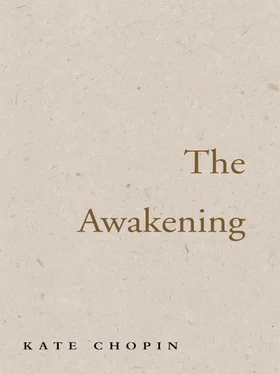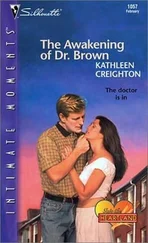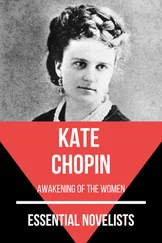Kate Chopin - The Awakening
Здесь есть возможность читать онлайн «Kate Chopin - The Awakening» — ознакомительный отрывок электронной книги совершенно бесплатно, а после прочтения отрывка купить полную версию. В некоторых случаях можно слушать аудио, скачать через торрент в формате fb2 и присутствует краткое содержание. Жанр: Современная проза. Описание произведения, (предисловие) а так же отзывы посетителей доступны на портале библиотеки ЛибКат.
- Название:The Awakening
- Автор:
- Жанр:
- Год:неизвестен
- ISBN:нет данных
- Рейтинг книги:3 / 5. Голосов: 1
-
Избранное:Добавить в избранное
- Отзывы:
-
Ваша оценка:
- 60
- 1
- 2
- 3
- 4
- 5
The Awakening: краткое содержание, описание и аннотация
Предлагаем к чтению аннотацию, описание, краткое содержание или предисловие (зависит от того, что написал сам автор книги «The Awakening»). Если вы не нашли необходимую информацию о книге — напишите в комментариях, мы постараемся отыскать её.
The Awakening — читать онлайн ознакомительный отрывок
Ниже представлен текст книги, разбитый по страницам. Система сохранения места последней прочитанной страницы, позволяет с удобством читать онлайн бесплатно книгу «The Awakening», без необходимости каждый раз заново искать на чём Вы остановились. Поставьте закладку, и сможете в любой момент перейти на страницу, на которой закончили чтение.
Интервал:
Закладка:
"I don't know whether I like you or not," replied Edna, gazing down at the little woman with a quizzical look.
The candor of Mrs. Pontellier's admission greatly pleased Mademoiselle Reisz. She expressed her gratification by repairing forthwith to the region of the gasoline stove and rewarding her guest with the promised cup of coffee. The coffee and the biscuit accompanying it proved very acceptable to Edna, who had declined refreshment at Madame Lebrun's and was now beginning to feel hungry. Mademoiselle set the tray which she brought in upon a small table near at hand, and seated herself once again on the lumpy sofa.
"I have had a letter from your friend," she remarked, as she poured a little cream into Edna's cup and handed it to her.
"My friend?"
"Yes, your friend Robert. He wrote to me from the City of Mexico."
"Wrote to you ?" repeated Edna in amazement, stirring her coffee absently.
"Yes, to me. Why not? Don't stir all the warmth out of your coffee; drink it. Though the letter might as well have been sent to you; it was nothing but Mrs. Pontellier from beginning to end."
"Let me see it," requested the young woman, entreatingly.
"No; a letter concerns no one but the person who writes it and the one to whom it is written."
"Haven't you just said it concerned me from beginning to end?"
"It was written about you, not to you. 'Have you seen Mrs. Pontellier? How is she looking?' he asks. 'As Mrs. Pontellier says,' or 'as Mrs. Pontellier once said.' 'If Mrs. Pontellier should call upon you, play for her that Impromptu of Chopin's, my favorite. I heard it here a day or two ago, but not as you play it. I should like to know how it affects her,' and so on, as if he supposed we were constantly in each other's society."
"Let me see the letter."
"Oh, no."
"Have you answered it?"
"No."
"Let me see the letter."
"No, and again, no."
"Then play the Impromptu for me."
"It is growing late; what time do you have to be home?"
"Time doesn't concern me. Your question seems a little rude. Play the Impromptu."
"But you have told me nothing of yourself. What are you doing?"
"Painting!" laughed Edna. "I am becoming an artist. Think of it!"
"Ah! an artist! You have pretensions, Madame."
"Why pretensions? Do you think I could not become an artist?"
"I do not know you well enough to say. I do not know your talent or your temperament. To be an artist includes much; one must possess many gifts—absolute gifts—which have not been acquired by one's own effort. And, moreover, to succeed, the artist must possess the courageous soul."
"What do you mean by the courageous soul?"
"Courageous, ma foi! The brave soul. The soul that dares and defies."
"Show me the letter and play for me the Impromptu. You see that I have persistence. Does that quality count for anything in art?"
"It counts with a foolish old woman whom you have captivated," replied Mademoiselle, with her wriggling laugh.
The letter was right there at hand in the drawer of the little table upon which Edna had just placed her coffee cup. Mademoiselle opened the drawer and drew forth the letter, the topmost one. She placed it in Edna's hands, and without further comment arose and went to the piano.
Mademoiselle played a soft interlude. It was an improvisation. She sat low at the instrument, and the lines of her body settled into ungraceful curves and angles that gave it an appearance of deformity. Gradually and imperceptibly the interlude melted into the soft opening minor chords of the Chopin Impromptu.
Edna did not know when the Impromptu began or ended. She sat in the sofa corner reading Robert's letter by the fading light. Mademoiselle had glided from the Chopin into the quivering love-notes of Isolde's song, and back again to the Impromptu with its soulful and poignant longing.
The shadows deepened in the little room. The music grew strange and fantastic—turbulent, insistent, plaintive and soft with entreaty. The shadows grew deeper. The music filled the room. It floated out upon the night, over the housetops, the crescent of the river, losing itself in the silence of the upper air.
Edna was sobbing, just as she had wept one midnight at Grand Isle when strange, new voices awoke in her. She arose in some agitation to take her departure. "May I come again, Mademoiselle?" she asked at the threshold.
"Come whenever you feel like it. Be careful; the stairs and landings are dark; don't stumble."
Mademoiselle reëntered and lit a candle. Robert's letter was on the floor. She stooped and picked it up. It was crumpled and damp with tears. Mademoiselle smoothed the letter out, restored it to the envelope, and replaced it in the table drawer.
| Go to Contents|
XXII
One morning on his way into town Mr. Pontellier stopped at the house of his old friend and family physician, Doctor Mandelet. The Doctor was a semi-retired physician, resting, as the saying is, upon his laurels. He bore a reputation for wisdom rather than skill—leaving the active practice of medicine to his assistants and younger contemporaries—and was much sought for in matters of consultation. A few families, united to him by bonds of friendship, he still attended when they required the services of a physician. The Pontelliers were among these.
Mr. Pontellier found the Doctor reading at the open window of his study. His house stood rather far back from the street, in the center of a delightful garden, so that it was quiet and peaceful at the old gentleman's study window. He was a great reader. He stared up disapprovingly over his eye-glasses as Mr. Pontellier entered, wondering who had the temerity to disturb him at that hour of the morning.
"Ah, Pontellier! Not sick, I hope. Come and have a seat. What news do you bring this morning?" He was quite portly, with a profusion of gray hair, and small blue eyes which age had robbed of much of their brightness but none of their penetration.
"Oh! I'm never sick, Doctor. You know that I come of tough fiber—of that old Creole race of Pontelliers that dry up and finally blow away. I came to consult—no, not precisely to consult—to talk to you about Edna. I don't know what ails her."
"Madame Pontellier not well?" marveled the Doctor. "Why, I saw her—I think it was a week ago—walking along Canal Street, the picture of health, it seemed to me."
"Yes, yes; she seems quite well," said Mr. Pontellier, leaning forward and whirling his stick between his two hands; "but she doesn't act well. She's odd, she's not like herself. I can't make her out, and I thought perhaps you'd help me."
"How does she act?" inquired the doctor.
"Well, it isn't easy to explain," said Mr. Pontellier, throwing himself back in his chair. "She lets the housekeeping go to the dickens."
"Well, well; women are not all alike, my dear Pontellier. We've got to consider—"
"I know that; I told you I couldn't explain. Her whole attitude—toward me and everybody and everything—has changed. You know I have a quick temper, but I don't want to quarrel or be rude to a woman, especially my wife; yet I'm driven to it, and feel like ten thousand devils after I've made a fool of myself. She's making it devilishly uncomfortable for me," he went on nervously. "She's got some sort of notion in her head concerning the eternal rights of women; and—you understand—we meet in the morning at the breakfast table."
The old gentleman lifted his shaggy eyebrows, protruded his thick nether lip, and tapped the arms of his chair with his cushioned fingertips.
"What have you been doing to her, Pontellier?"
"Doing! Parbleu! "
"Has she," asked the Doctor, with a smile, "has she been associating of late with a circle of pseudo-intellectual women—super-spiritual superior beings? My wife has been telling me about them."
Читать дальшеИнтервал:
Закладка:
Похожие книги на «The Awakening»
Представляем Вашему вниманию похожие книги на «The Awakening» списком для выбора. Мы отобрали схожую по названию и смыслу литературу в надежде предоставить читателям больше вариантов отыскать новые, интересные, ещё непрочитанные произведения.
Обсуждение, отзывы о книге «The Awakening» и просто собственные мнения читателей. Оставьте ваши комментарии, напишите, что Вы думаете о произведении, его смысле или главных героях. Укажите что конкретно понравилось, а что нет, и почему Вы так считаете.












